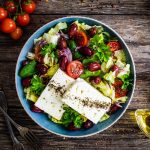Which diet is better for IBS? New research comes to SURPRISING conclusion
 (NaturalHealth365) In recent years, there’s been a worrying surge in a particular health issue across the United States, affecting about 6.1% of the population. Known as IBS, or irritable bowel syndrome, this troublesome condition is not confined to just one country. Estimates suggest that between 10% and 23% of people worldwide will grapple with its symptoms at some point in their lives.
(NaturalHealth365) In recent years, there’s been a worrying surge in a particular health issue across the United States, affecting about 6.1% of the population. Known as IBS, or irritable bowel syndrome, this troublesome condition is not confined to just one country. Estimates suggest that between 10% and 23% of people worldwide will grapple with its symptoms at some point in their lives.
For those dealing with the challenges of IBS, there might just be a ray of hope tucked away in recent scientific investigations. Digging into the world of nutrition, a study published in Alimentary Pharmacology & Therapeutics reveals intriguing discoveries. It hints at a potential solution that many are yet to grasp fully, which could hold the key to easing the burdens of this puzzling condition. But what could this breakthrough be? What dietary strategy might offer relief to those wrestling with the discomforts of IBS? Keep reading to discover the recent revelations.
Why the right diet might relieve your digestive issues
Residents of the Mediterranean region regularly incorporate beans, onions, and whole grains into their meals. While bean consumption may initially raise concerns about stomach discomfort, the broader spectrum of foods found in this “diet of the sea” offers significant benefits for gastrointestinal health. Plus, if you’re concerned about gas developing from eating beans … be sure to follow soaking instructions (prior to cooking) for many types of beans.
A recent study on gut health focused on analyzing a group of 59 individuals over a span of six weeks. These participants were divided into two categories:
- Those who followed the popular Mediterranean diet – supplemented with guidance from a dietitian.
- A control group that continued with their usual dietary habits.
The study aimed to investigate whether previous findings suggesting that the Mediterranean diet could alleviate symptoms of depression could also be relevant for individuals dealing with IBS. Additionally, since there’s a notable intersection between IBS and mental health conditions like depression and anxiety, researchers hoped that improving mental well-being might lead to better management of gut symptoms among IBS sufferers.
Navigating IBS: Choosing between low FODMAP and the Mediterranean diet?
The randomized controlled trial revealed that patients with IBS could effectively adhere to the principles of a Mediterranean diet (MD) and found the diet acceptable. Participants following the Mediterranean diet experienced significant improvements in both gastrointestinal (GI) and psychological symptoms, with 83% reporting a decrease in GI symptoms severity and 62% reporting an improvement in depressive symptoms. This suggests that the Mediterranean diet could potentially alleviate both gut and mental health symptoms in IBS.
Interestingly, despite being conceptually opposite to the low FODMAP diet, which is commonly used to manage IBS, the Mediterranean diet still demonstrated beneficial effects on GI symptoms. FODMAP stands for fermentable oligosaccharides, disaccharides, monosaccharides, and polyols, which are short-chain carbohydrates that the digestive system may struggle to process efficiently. A low FODMAP diet involves reducing the intake of these specific types of carbohydrates that are known to be challenging for digestion.
The study suggested that the Mediterranean diet might influence GI symptoms through changes in dietary intake, microbial composition, and modulation of the gut-brain axis. The authors highlighted previous research revealing that the Mediterranean diet boosts the number of saccharolytic bacteria that benefit gut health. The diet also provides anti-inflammatory effects through microbiome mediation.
Moreover, the MD showed promise as a feasible and less restrictive dietary intervention compared to the low FODMAP diet, especially for individuals with psychiatric conditions.
How to weave the staples of the Mediterranean diet into your meals
Transitioning to the Mediterranean diet doesn’t have to be daunting. By incorporating its staple ingredients into your meals, you can reap the benefits of this wholesome eating pattern. Here’s how to weave the Mediterranean delights into your daily dining: (Of course, organic varieties are best.)
- Embrace olive oil: Swap out other cooking oils for heart-healthy organic extra virgin olive oil. Drizzle it over salads or use it for sautéing vegetables to add a flavorful touch.
- Savor olives and nuts: Snack on olives and nuts instead of processed snacks. They make for satisfying munchies packed with nutrients.
- Harness the power of beans: Beans are versatile and nutritious. Add them to soups, salads, or main dishes for a boost of protein and fiber.
- Indulge in organic fruits and vegetables: Load your plate with colorful fruits and vegetables. Whether fresh or cooked, they provide essential vitamins, minerals, and antioxidants.
- Incorporate fresh wild-caught fish: Make fish the star of your dinners. Grill, bake, or poach it with herbs and spices for a nutritious main course.
Prioritizing these Mediterranean staples offers more than just culinary satisfaction; it presents an opportunity to fuel your body with nourishing elements. Consider the potential health advantages and transition from fast and processed options to the Mediterranean diet to foster a healthier lifestyle and overall wellness.
Sources for this article include:



